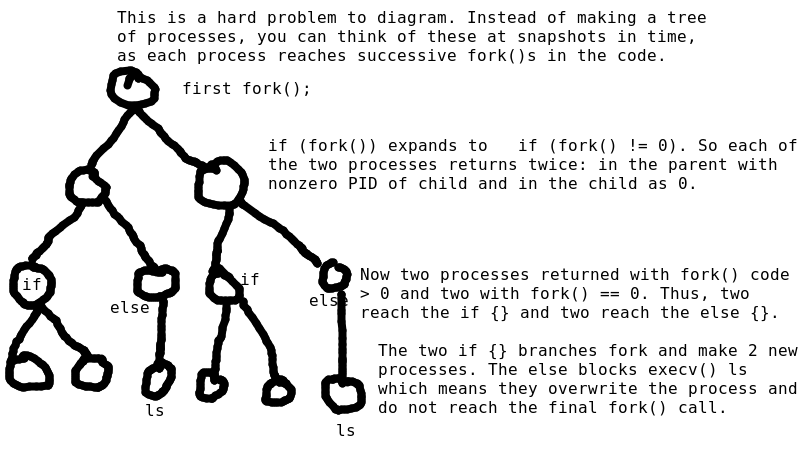Bug snack: forks upon forks
Published:
I wouldn’t eat a cockroach. But this bug snack is quite delectable. This “bug” is a fun little puzzle to solve. I think this is an interesting question to discriminate OS programming experience across a wide range of skill levels.
Part 1
By inspecting the code, how many processes are created and how many times is ls run?
#include <stdio.h>
#include <unistd.h>
int main (int argc, char *arg[])
{
fork ();
if (fork ()) {
fork ();
} else {
char *argv[2] = {"/bin/ls", NULL};
execv (argv[0], argv);
fork ();
}
}
Reveal Answer
Let’s trace the execution of this code snippet.
The initial fork() call creates a child process, resulting in two processes. Now there are two processes which proceed to the if (fork()). Note that if (fork()) is equivalent to if (fork() != 0). fork works by cloning the entire data of the process. fork returns to the parent process with the process ID (PID) of the child and returns in the child process with 0.
Thus, there are now two processes which return inside the if (fork()) with a return code > 0 and two with return code == 0. Two processes fall through to the if block and then fork(), creating two more processes.
The other two processes take the else block. The execv() call switches the process to ls. execv replaces the current process with the ls command, so no additional processes are created.
Therefore, a total of six processes are created, and the ls command is run twice.

Part 2
What is the output of this program? How many times do you think “start” and “else” are printed?
#include <stdio.h>
#include <unistd.h>
int main (int argc, char *arg[])
{
printf("start");
fork ();
if (fork ()) {
fork ();
} else {
char *argv[2] = {"/bin/ls", NULL};
execv (argv[0], argv);
printf("else");
fork ();
}
}
Reveal Answer
Answer: startstartstartstart is printed and else is not printed. (else could be printed in a weird edge case where execv fails, say due to exhausted process space or /bin/ls not existing.)
$ ./a.out
startstartstartstarta.out main.c
a.out main.c
Part 3
With access to edit and run the code, explain this behavior.
Reveal Answer
In short, the printf does not have a \n, so the buffer does not get flushed. Each fork clones the entire process (and its unflushed buffer). All of the forked process’ buffers get printed to the console.
This bug is kind of interesting because the execv is a red herring. If you change that line to something like return or exit you get a different number of prints. Moreover, this is not a bug at all — it’s the defined behavior of fork. This makes the behavior undebuggable with gdb.
in Unix, output is controlled by the line mode (a part of a larger subsystem called the line discipline). essentially the line mode has two options, cooked and raw (yes, those are the names). in cooked mode, for efficiency, output from printf is buffered in the process until a newline, at which point the buffer gets printed. so printf("hi") gets buffered, but printf("hi\n") gets immediately printed. and cooked mode is the default. in raw mode, everything gets printed immediately (even single characters).
since printf("hi") is buffered, when the program calls fork the child also has "hi" in its buffer (and also their children). this eventually results in multiple processes printing hi even though only the original parent called printf.
in short, on Unix the newline matters.
for your original program, running stty raw in your shell before you run the program should make it behave more like you expect it would.
Don’t believe me? How can we test this? Tools like gdb and strace will not be of much use. To test this theory, we need to realize that the unbuffered text does not get magically printed by the shell. The following program does not print “start”.
int main (int argc, char *arg[])
{
printf("start");
raise(SIGABRT);
}
It is libc semantics to flush the buffer on clean exit. This is not OS semantics, but the implementation of how libc exits. Of course, if you print with a newline then this problem will never arise.
Thanks to Anon. Calc and Professor Voelker.



